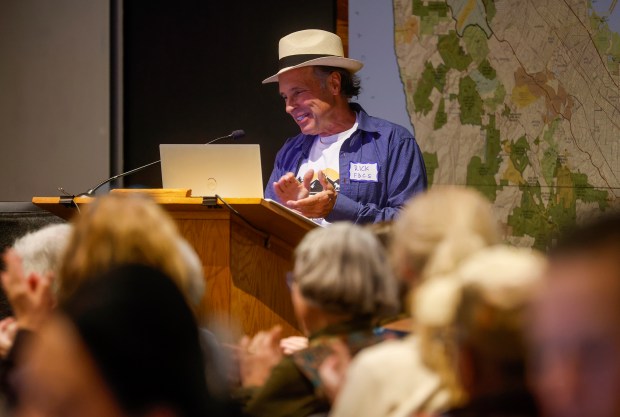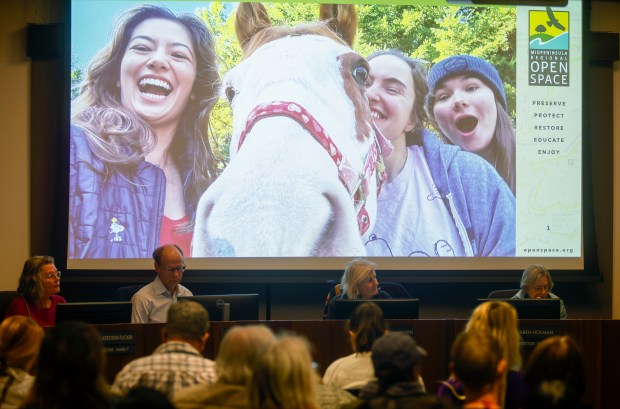After months in limbo, the Bear Creek Stables in Los Gatos will live to see another day.
The historic stables have for years offered horse boarding, riding lessons and camps. Though the stables are owned by the Midpeninsula Regional Open Space District, it contracts out its day-to-day operations to a third party, the Chaparral Country Corporation.
In the face of mounting allegations of animal abuse against Chaparral and what Midpen staff have called “significant escalating costs” of the stables’ overall maintenance and operation, the special district’s board was poised to decide in May on whether to preserve the stables in their current form, shut down their operations or some sort of in-between. But directors voted to delay the decision, instead opting to form an ad hoc committee to work for about four months on researching and proposing an alternate solution.
The ad hoc committee’s alternate solution, which the board approved in a 5-2 vote late Wednesday night, entails a phased approach to maintenance and operations and would hand over some of those responsibilities to a nonprofit that would be better suited to fundraise and maintain the stables, such as the Friends of Bear Creek Stables, a 501(c)(3).
The committee consists of Midpen directors Craig Gleason, Curt Riffle and Karen Holman as well as a “self-selected” group of more than 30 volunteer community members. The group has been meeting regularly since May to research and come up with a presentation of their alternate solution to the board, one that emphasized reviving free public programming that would draw underserved communities to the stables and would be bolstered by funds from the stables’ ongoing horse-boarding operation.
The public programming would “bring in a broader and more diverse public that includes not only the local equestrian interests that have been there in the past but a much more wide swath of the public and underserved communities,” committee member Peggy Kauffman said at the meeting.
Rick Parfitt, president of the Friends of Bear Creek Stables, urged the board to approve the alternate solution.
“We know more details need to be worked out,” Parfitt said. “I hope the board can give its full support — with staff and the community working together, we will succeed.”
The solution that the board approved would cost the special district about $7 million, less than the $9.5 million-$10.5 million it projected repairs would cost back in May but more than the $1 million to $2 million it would cost to close the stables’ operation entirely. Part of the ad hoc committee’s charge was to come up with a plan to secure funds or grants to support the work needed on the project. The involvement of a nonprofit, the committee argued, would enable the stables to have access to fundraising that a special district such as Midpen would usually not be able to take part in.
Midpen’s administrative office in Los Altos was packed the night of the meeting. Dozens of horse boarders, equestrian enthusiasts and other community members turned out to speak during public comment, urging the board to save the stables and speaking passionately about the merits of easy access to horses and other animals in the Bear Creek Redwoods.

“Something about the relationship of animals and people that can bring people who have no faith in themselves to a new life,” community member Robert Cornelius said in public comment. “I think Bear Creek Stables can offer that to the community, and that is important to me.”
Riffle said he was initially resistant to supporting the maintenance of the stables earlier this year, but after seeing how community members turned out to work on the ad hoc committee, he was willing to take a chance on the nonprofit option.
Directors Margaret MacNiven and Yoriko Kishimoto, the only two to vote against the committee’s alternate solution, largely cited the costs associated with the alternative solution.
Though the ad hoc committee’s solution was approved by a majority, some directors emphasized a desire to include “offramps” in the next steps for the stables — opportunities for the board and for Midpen to back out of the plan if need be.
The directors voted unanimously to direct Midpen’s general manager to return to the board with a contract between the nonprofit and the special district “that identifies clear roles, responsibilities and expectations” and a set of milestones that the project would have to meet before it “substantially invests” in the project.

“Should something fall apart in these negotiations and not come to something that we feel is appropriate, we can stop,” Director Zoe Kersteen-Tucker said.
Chaparral Country Corporation, which currently has a concessionaire agreement with Midpen for its operation of the stables, has come under fire this year for allegations of animal abuse and mistreatment of the horses under its care at facilities it manages in other parts of the Bay Area.
Gleason, also the chair of the ad hoc committee, has also previously described “serious animal care issues” at Bear Creek and cautioned against continuing to work with Chaparral.
“Listening to some of the comments by board members, I was wondering how much the experiences with the current concessionaire were coloring what the future might hold for Bear Creek Stables,” Holman said. “It’s not been a good situation, and I’m not interested in going forward with the current concessionaire.”
Originally Published:
Source: www.mercurynews.com
